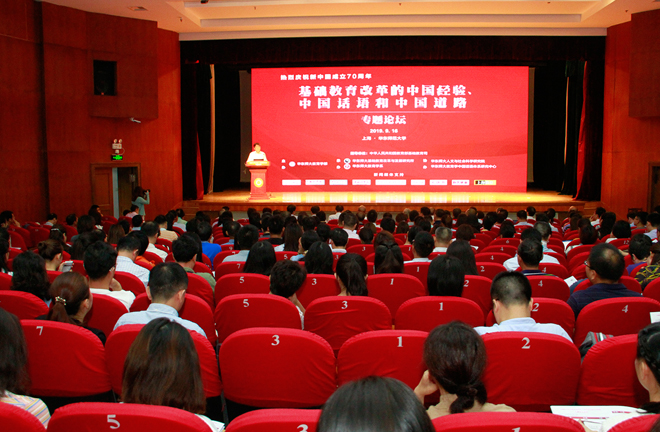Experts review seven decades of China’s basic education

The recent forum on China’s basic education in Shanghai Photo: Zha Jianguo/CSST
SHANGHAI—At a recent forum hosted by East China Normal University, experts looked back on the past seven decades of China’s basic education and offered suggestions for its future development.
China’s basic education has developed by leaps and bounds since the founding of the People’s Republic of China 70 years ago, said Tong Shijun, party secretary of East China Normal University. China regards compulsory education as its top priority and strives to promote the all-around development of basic education. Guided by the all-around development policy, China continuously improves the quality of education. In addition, China advocates equal attention to efficiency and equity and emphasizes the use of information technology to promote education modernization, while continuously strengthening international cooperation and exchanges in the field of basic education.
Equity in education is a requirement of education modernization. Yang Yinfu, secretary general of the Secretariat of the Chinese Society of Education, pointed out that the quality of education at all levels in China has reached the average level of that of the world’s middle and high income countries, and its compulsory education has reached the average level of that of the world’s high-income countries.
In terms of educational equity, the Chinese approach has become to prioritize development, fund
students when necessary, narrow gaps, and increase investment in education. In the future, Yang said that we should further promote education equity by improving education quality.
In recent years, educational equity in China’s rural areas has been greatly improved. Qin Yuyou, a professor at the Institute of Rural Education Development at Northeast Normal University, said that the investment system of rural education has continuously advanced, providing a material basis for the reform and development of rural education.
In the future, Qin suggested establishing a sound balance between investment capacity and input commitment, while taking into account the profitability and public welfare of private investment in education.
Zhu Xudong, a professor from the Faculty of Education at Beijing Normal University, analyzed the development of education for teachers in China over the past 70 years and proposed a Chinese path for the future construction of the teacher training system.
Zhu noted that in the future China should focus on building a system for training teachers at first-class universities, a system for training teachers in regard to Internet Plus, a system for training teachers at the district and county level, and a disciplinary system for training teachers.
edited by JIANG HONG

 PRINT
PRINT CLOSE
CLOSE